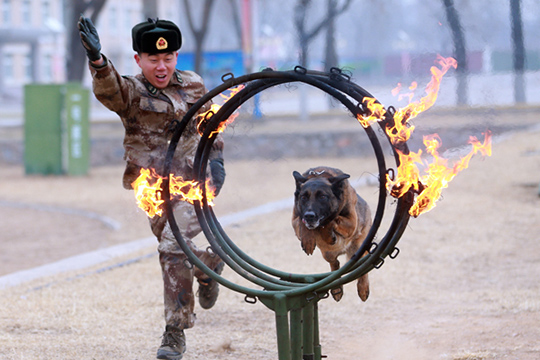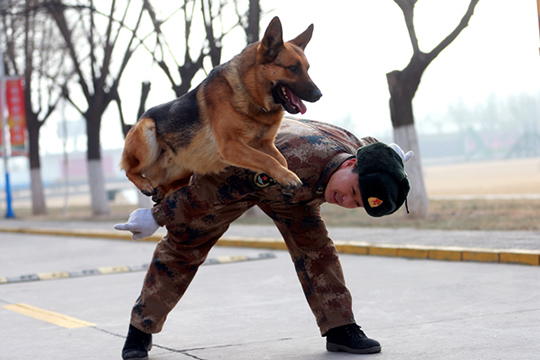


A trainer encourages his dog to leap through a ring of fire at the People's Liberation Army's dog training center in Beijing. [Photo by Zou Hong/China Daily]
Allen crept forward in complete silence, his eyes locked on a tent about 50 meters away. As a special member of the People's Liberation Army, his natural talents enabled him to sense the enemy hiding inside the tent, which is something his partner, Yang Yuhai, will never be able to do, no matter how hard he trains.
When Allen had closed in on the tent and was certain the target was inside, he stood up without a sound. That was the signal for Yang, who had stayed behind, to move forward as quickly as possible, so the 26-year-old soldier ran towards Allen and pointed his rifle at the tent.
He shouted and called on the enemy to surrender. Allen then began to bark frenziedly to intimidate the target, who chose to run instead of giving himself up. Clearly, it was not a good move to make in front of an army dog. At Yang's command, Allen attacked the target and dragged him to the ground, his powerful jaws clamped around the man's arm.
That is just one of the daily routine training sessions that Allen and Yang, an army dog trainer, regularly tackle together at China's only base that breeds and trains dogs especially for the PLA. The "enemy" was played by another trainer, who wore protective gear, without which his arm would have been fractured by the powerful jaws of the Belgian Malinois, one of several breeds the PLA uses in its activities.
Founded in 1985, the base in Beijing currently has more than 700 dogs undergoing training. It costs 15,000 yuan a year ($2,181) to train, feed and accomodate each dog.
The PLA has decided that four-legged Special Forces will play a more important role in military operations in the future, so training programs have been adjusted to resemble actual combat situations as much as possible.
"The duties of army dogs in China are shifting from guarding military sites, patrolling borders and search-and-rescue missions to actual combat and counterterrorism," said Zhang Ke, the director of training at the base.
Special soldiers
About 1,000 dogs are currently serving in China's military forces, and, in accordance with a directive on army dogs issued by the PLA in 2015, they are regarded as special soldiers and official members of combat units.
In the future, elite dogs such as Allen - ultra-obedient and with the ability to execute missions with precision - will team up with soldiers in special operations units, Zhang said.

A new canine recruit is put through his paces at the training base.[Photo by Zou Hong/China Daily]
Like all the dogs in the training school, when Allen was born at the base he was immediately tagged and enlisted. When he was just 6-months-old, the puppy was paired with Yang, who decided to call him Allen because he liked the sound of the name. The 2-year-old is now a star after winning the top prize at an international competition for army dogs held in Russia last year.
When the dogs complete their training and are ready to undertake missions, they will be dispatched to troops around China. The base also provides training for the soldiers who will handle the dogs. "It's as though we produce weapons here and we also teach people how to use them," Zhang said.
Although China now has state-of-the-art weaponry, army dogs remain irreplaceable military assets because of their extraordinary sense of smell, rapid reactions and, most important, their loyalty. The PLA will deploy more specially trained dogs to meet different demands from different troops, he added.
Comrades-in-arms
For Yang, Allen is not just a powerful weapon. "He is my comrade-in-arms and best friend. I cannot imagine him losing his life during an operation like some of our dogs, but as soldiers, the dogs know they need to face danger head on," he said.
Wang Peng still becomes emotional whenever the name "Bande" is mentioned. Wang's job is to take care of newborn puppies at the base. Bande, a German Shepherd, was born in 2008, but his mother died soon after giving birth. Since no other dogs would take the puppy in, Wang decided to nurse Bande himself, wrapping the dog in his own clothes to keep him warm. He wasn't sure if Bande would survive the cold winter.

Sanpao, an 8-year-old army dog, plays with his trainer. [Photo by Zou Hong/China Daily]
With Wang's care, Bande grew to be a strong, outstanding army dog. In 2010, he was dispatched to a border control unit in the southeastern province of Yunnan, but two years later, he lost his life during an operation to apprehend cross-border drug traffickers. His jaws were still locked around a trafficker's hand when he died.
Wang sat and looked at a photo of himself and Bende together. In the picture, Bande stood with his forelegs on Wang's shoulders as he licked his handler's face. "It was like losing a family member. Bande was a true hero," Wang said.
 Fire brigade in Shanghai holds group wedding
Fire brigade in Shanghai holds group wedding Tourists enjoy ice sculptures in Datan Town, north China
Tourists enjoy ice sculptures in Datan Town, north China Sunset scenery of Dayan Pagoda in Xi'an
Sunset scenery of Dayan Pagoda in Xi'an Tourists have fun at scenic spot in Nanlong Town, NW China
Tourists have fun at scenic spot in Nanlong Town, NW China Harbin attracts tourists by making best use of ice in winter
Harbin attracts tourists by making best use of ice in winter In pics: FIS Alpine Ski Women's World Cup Slalom
In pics: FIS Alpine Ski Women's World Cup Slalom Black-necked cranes rest at reservoir in Lhunzhub County, Lhasa
Black-necked cranes rest at reservoir in Lhunzhub County, Lhasa China's FAST telescope will be available to foreign scientists in April
China's FAST telescope will be available to foreign scientists in April "She power" plays indispensable role in poverty alleviation
"She power" plays indispensable role in poverty alleviation Top 10 world news events of People's Daily in 2020
Top 10 world news events of People's Daily in 2020 Top 10 China news events of People's Daily in 2020
Top 10 China news events of People's Daily in 2020 Top 10 media buzzwords of 2020
Top 10 media buzzwords of 2020 Year-ender:10 major tourism stories of 2020
Year-ender:10 major tourism stories of 2020 No interference in Venezuelan issues
No interference in Venezuelan issues
 Biz prepares for trade spat
Biz prepares for trade spat
 Broadcasting Continent
Broadcasting Continent Australia wins Chinese CEOs as US loses
Australia wins Chinese CEOs as US loses